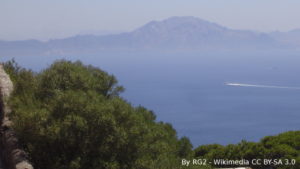 By CherryX per Wikimedia Commons, CC BY-SA 3.0
By CherryX per Wikimedia Commons, CC BY-SA 3.0
The EU has long prided itself on being a leading supporter of international democratic change. Its development cooperation budget for the period 2021-2027 has allocated €1.5 billion for a dedicated ‘Thematic Programme on Human Rights and Democracy’. The EU has also joined forces with several of its member states to pursue a Team Europe Initiative on Democracy to strengthen the collective visibility, effectiveness and impact of their various democracy support programmes.
In her last annual State of the Union address to the European Parliament, European Commission President von der Leyen called for a rethink of the EU’s foreign policy agenda. Reflecting on the global implications of Russia’s invasion of Ukraine, she considered that “this is the time to invest in the power of democracies”. Although “our friends in every single democratic nation on this globe” form a core group of like-minded partners with which the EU seeks to shape global goods, von der Leyen also recognised the need to engage beyond the EU’s democratic partners – including through its Global Gateway infrastructure investment initiative. The EU’s efforts to become energy-independent from Russia underlines the need for a broad engagement, but also highlights the challenge of doing so in a way that is consistent with its democracy promotion commitments. One example of this tension was von der Leyen’s presence at the opening of the Interconnector Greece-Bulgaria pipeline that enables direct gas imports from Azerbaijanregime has been accused of carrying out an extensive crackdown on civil and political liberties in recent years. The EU’s credibility and effectiveness as a democracy promotion actor requires awareness of this tension between its commitment to democracy and its economic interests.
Notwithstanding its tensions with other policy fields, the EU’s democracy support itself often inadvertently contributes to enabling authoritarianism. In the Southern and Eastern neighbourhood regions, for instance, the EU’s democracy support had the unintended effect of strengthening illiberal reform coalitions. In the South-Caucasus region, political incumbents used EU-supported anti-corruption projects to discredit their political opponents, which in turn weakened the EU’s legitimacy among liberal-minded voters. Research on EU democracy support in Sub-Saharan Africa describes how authoritarian regimes have acted to counteract international democracy support, e.g. in Ethiopia where the authorities further restricted the space for civil society.
Moreover, other than failing to prevent undemocratic actors from taking nefarious counter measures, the ways in which EU democracy support is delivered may work against the very “democrats” it seeks to support. For example, international democracy support has sometimes eroded the transformational potential of civil society organisations. Dependence on external funding, implementation requirements (e.g. logframes and reporting) and the increased exposure to being labelled as foreign agents that both encompass has often contributing to these organizations prioritising more depoliticised, “tame” forms of democracy support.
Also, despite a self-proclaimed “turn to resilience”, EU democracy support often risks impeding the very structures that make a society resilient. For instance, analysis of the EU’s democracy support in the Acholi region in Uganda shows how the EU’s prioritization of youths risks causing further generational tensions among an already fractured society. Rather than engaging with different local imaginaries of what is considered “freedom” or “justice”, the EU assumes that poverty and lack of skills prevent these local communities from sufficiently imagining and claiming political rights and civil liberties. Consequently, the EU’s support is predominantly targeted at empowering Acholi youths in terms of individual entrepreneurship, particularly in the most remote rural communities. Yet, many of those communities understand such emphasis on the individual as well as the exclusion of other important members of society, i.e. the elders, to represent a fundamental corruption of Acholi society and its values, and to be disconnected from their needs and concerns. In addition, it should also be noted that such international support as provided by the EU does little to curb the power of the authoritarian government over this region, on the contrary. Since the government increasingly emphasises the need for privatisation and job creation, any effort to engage these youths in terms of business development is likely to appease an important section of society with which the authoritarian Ugandan government increasingly struggles to create legitimacy.
These examples underline that EU cooperation initiatives are introduced in complex multi-actor settings and as such are inherently political. While international development policy debates are continuously looking into how to improve and apply frameworks and approaches that are sensitive to the contexts in which these interventions are made – e.g. “Thinking and Working Politically” – such sensitivity nevertheless often prioritizes consideration of how the local context might affect the external interventions concerned, rather than vice-versa. These frameworks also tend to too narrowly focus on project implementation, without allowing to assess the intended and unintended effects of the EU’s wider engagement in the country and regions concerned.
Beyond satisfying academic inquiry, analysing and acknowledging the (un)intended effects of EU democracy support within the wider context of its external action brings two potential gains. First of all, it will allow us to learn more about the effectiveness of the specific budgets set aside for democracy support abroad. Secondly, such a broad inquiry will both allow us to learn more about how the EU is perceived by its partners – who generally look beyond individual projects when forming such appreciations over time – and also signal the EU’s willingness to learn from its international cooperation efforts. The latter would be a key condition to practicing in international cooperation what it funds in partner contexts: promoting open and responsive societies.
Authors: Niels Keijzer (German Institute of Development and Sustainability) & Nathan Vandeputte (Ghent Institute for International and European Studies, Ghent University)
About: This blog was developed in the context of the MORDOR project, an education and research project that looks into authoritarianism and EU democracy support, co-funded by the Erasmus Plus program of the European Union. More information: https://mordorproject.eu/




